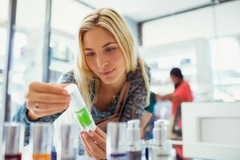Cosmetics Europe welcomes EU Parliament’s vote to fight greenwashing amid wider industry support

13 Mar 2024 --- Cosmetics Europe, representing national-level manufacturers and associations, applauds the EU Parliament’s adoption of the Green Claims Directive. The governmental body seeks a pre-approval and verification process for environmental marketing claims — such as “net zero” and “carbon neutral” — to shield consumers from “misleading” advertisements.
EU Ecolabel certification emerges as a solution, with the EU Commission (EC) spotlighting Cosmopak for achieving the validation across its formulation and packaging.
“The EU cosmetics industry fully supports the objectives of the Green Claims Directive. Together with the proposal on Empowering Consumers for the Green Transition, the new rules will be key to fighting greenwashing practices and creating a level playing field (and legal clarity) among traders,” states the cosmetics association.

Cosmetics Europe believes the new rules will help to ensure consumers have access to “trustworthy, relevant and transparent” information about the sustainability of the products and services they pay for.
“The Green Claims Directive is specifically important for the cosmetics industry because cosmetic claims play a crucial role in differentiating cosmetic products from each other, stimulating innovation and fostering competition.”
EU sources say Tuesday’s adoption marks one step toward the finalization of the law, which is expected to come into effect by early 2025. The upcoming Parliament will follow up on the file after the June elections. Penalties for false claims include exclusion from procurement, revenue loss and a minimum fine of 4% of annual turnover.
Penalties for false claims include exclusion from procurement, revenue loss and a minimum fine of 4% of annual turnover.
“A real problem”
During the debate, Internal Market Committee rapporteur Andrus Ansip emphasized that consumers cannot evaluate the veracity of claims and are unaware that a claim made about the entire product may, in reality, only apply to one aspect of it. “Greenwashing is a real problem. The same claim can have a totally different meaning in different EU member states.”
“The Green Claims Directive is about commercial green claims. With this proposal, we are not reshaping the carbon market or taxing businesses. Companies can use green claims or not. It is up to them. It’s their free choice.”
“Studies show that over 50% of environmental claims are vague, misleading or unfounded. We cannot speak about happy consumers if every other green claim is false,” says Ansip.
“We cannot talk about a level playing field for our entrepreneurs while some traders are cheating. I believe the Green Claims Directive adopted is balanced — it will bring clarity to our consumers and is less burdensome for traders than the claim-by-claim verification.”
Pre-approval, deadlines and penalties
EU Parliament says that under the Green Claims Directive, businesses would have to provide proof for any environmental marketing claims before marketing products as “biodegradable,” “less polluting,” “water saving,” or with “bio-based content.” Against false advertising, EU nations would also need to appoint verifiers to pre-approve claims..jpg) Companies must verify environmental marketing claims before using them.
Companies must verify environmental marketing claims before using them.
While the Parliament demands that claims and supporting documentation be evaluated in 30 days, simpler claims and goods might benefit from more rapid or easier verification. The new regulations do not apply to micro-enterprises, and SMEs would have an extra year to comply with the rules than larger companies.
However, the European Environmental Bureau is concerned about adding a simplified verification process that offers the potential to award a “presumption of conformity” for specific claims in the future.
Furthermore, the governmental body also warns businesses that violate the regulations risk penalties, such as losing revenue, being temporarily barred from public procurement tenders and paying fines of at least 4% of their yearly turnover.
Carbon offsetting and hazardous substances
Green claims that rely only on carbon offset plans will not be permitted, mandates EU Parliament.
However, businesses that have minimized their emissions and are using the programs for residual emissions may talk about offsetting and carbon removal programs in their advertisements.
Schemes involving carbon credits, like those created under the Carbon Removals Certification Framework, must be “certified and be of high integrity.”
The Parliament also decided that green claims about products that contain hazardous materials should be allowed for the time being but that the EC should determine “in the near future” whether they should be banned entirely.
“It is time to put an end to greenwashing. Our position ends the proliferation of misleading green claims that have deceived consumers for far too long. We will ensure businesses have the right tools to embrace genuine sustainability practices,” said Environment Committee rapporteur Cyrus Engerer. Simpler environmental claims may undergo quicker verification.
Simpler environmental claims may undergo quicker verification.
Industry requests to Parliament
Cosmetics Europe further supports the release of a European Commission report on the use of “explicit environmental claims” on goods or products that contain potentially hazardous ingredients, preparations or mixtures. These hazards are identified in the CLP (classification, labeling and packaging) and REACH (registration, evaluation, authorisation and restriction of chemicals) regulations.
“However, we believe that the defined timeline to publish the report is too short and would recommend a more realistic timeframe, i.e., at least three years after the entry into force of the Directive.”
Additionally, it supports the Parliament’s decision to permit the use of private labels if they offer the consumer “added value.” It requests that these labels be permitted until a specific EU law governing them is adopted.
“Cosmetics Europe will continue to engage in a constructive dialogue with policymakers to ensure a workable and efficient system for consumers and the industry,” it states.
Spotlight on Cosmopack
EU Ecolabel is one example of a scheme offering uniformity in green certification. Cosmopak, a supplier of luxury cosmetics to the EU hospitality industry, received this certification for its scaleup of eco-friendly hotel amenities.
Over a year, the company overhauled its formulas, raw materials and packaging to achieve the distinction.
“It was a big challenge gaining the EU Ecolabel certification because our formulas — raw materials and recipes — and our packaging had to be changed. It was a process that took around one year. Now we benefit from having more clients and more environmentally friendly products,” says Juan Haim Castro, design engineer at Cosmopak.
Sourcing preservatives that met the limits on hazardous substances was a challenge, requiring collaboration with suppliers along the product value chain.
Additionally, Cosmopak transitioned from virgin PET to recycled PET for its bottles, caps and labels. This switch met certification requirements, having low toxicity to aquatic organisms, notes EC.
Cosmopak advises brands seeking EU Ecolabel certification to be patient when finding raw materials that comply with the criteria.
In recent efforts to combat greenwashing, the International Natural and Organic Cosmetics Association and the European Natural Beauty Awards collaborated and shared bottom-up and top-down approaches to tackle false claims in the cosmetics industry.
By Venya Patel













